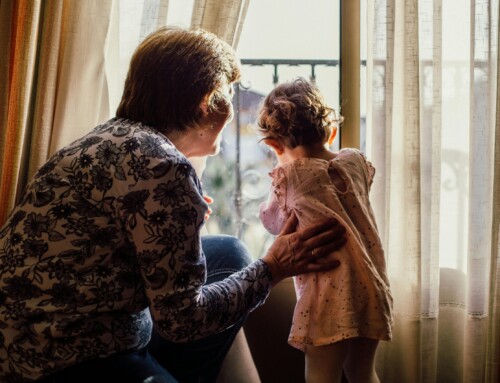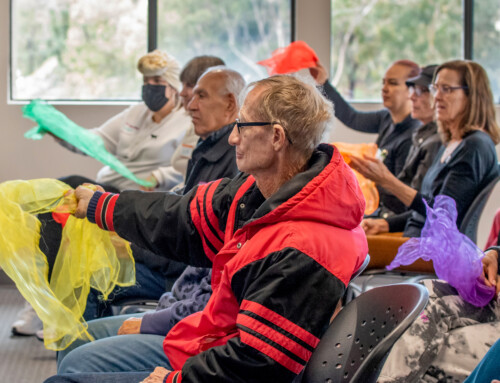Have you lost your patience with someone and later wished you had handled it differently? Nobody enjoys getting angry with a friend or loved one, but it happens to the best of us. Losing your cool actually elevates your blood pressure and heart rate and releases cortisol, which can cause a host of health problems. Learning to behave with patience not only benefits you physically – your interpersonal relationships will thank you in the long run.
In my own life, I’ve worked on becoming more patient. And I knew my biggest challenge was going to be learning to listen. After all, it is through listening that you build relationships, show respect and allow yourself to be fully present for another person.
As a social worker at Alzheimer’s San Diego, I get calls from dementia care partners looking for the same thing. Some call because they have recently lost patience, and they feel bad about themselves. I hear the frustration in their voice as the tears roll down their cheeks. I feel honored when they share their stories. I know the reason they call is because they are sad about what happened, and they need to tell someone that they truly were trying their best but – in that moment – they “lost it.” I listen because I want them to know that losing your patience is normal and happens to the best of us. It happens even when you are doing your best not to lose it.
RELATED | Find comfort through Support & Discussion Groups
When you’re a caregiver, worry beckons at your door daily – especially when you are caring for someone living with dementia. It can take an immense physical toll. Not only is it associated with generalized stress, sleep deprivation, anxiety and depression – it also affects personal relationships and family dynamics. Patience is often lost because dementia caregivers are just trying to survive.
Patience is a virtue because it requires self-control. It requires you to have insight about the people you care about and their happiness. It is also allowing you to remain calm in the face of frustration and anger. As a caregiver, you are making tough decisions daily about someone else’s needs. Someone gave you a gift and entrusted you with their personal safety. It’s up to you to make the choices they are unable to make on their behalf.
There’s no shortcut to building patience. If you’re looking to make lasting changes within yourself, you are going to have to do the work. I’ve learned a lot on my personal journey to become more patient. Here are some practical tools that helped me along the way.
1) Take a breath. Did you know breathing can calm your parasympathetic and sympathetic system? It can help you conserve energy and slow down your heart rate. When a focused relaxation breathing technique is activated, it can produce a calm feeling over your mind and body, causing a relaxation response. Slow, deep belly breaths will also create a relaxed attitude and help you to slow down and manage emotions. Breathing will enable you to be receptive to others’ needs and feelings. As a bonus, it’s also linked to good health!
2) Set boundaries. Setting healthy boundaries will help define your needs and abilities. By doing this, we are teaching others how we want to be treated and what types of behaviors we will allow. Boundaries will help you create an environment where you can lessen anxiety, anger and resentment, while also promoting self-esteem and building confidence.
3) Practice gratitude. When you are feeling at your lowest, practicing gratitude can make a profound difference. It is our ability to show thankfulness for our blessings that reminds us all is not lost, and that good things are present even during challenge times. Many people create gratitude journals and write in them daily as an easy way to start this practice.
4) Identify triggers. This is so important because awareness is the key to change. Most people do not regularly ask themselves their current stress level. Identifying triggers can give you a heads-up before you lose your cool. Journaling and list-making are great ways to become aware of things that upset you and cause hurtful feelings.
5) Manage negative thinking. A negative thought can instantaneously put you in a negative frame of mind. Did you know that we have approximately 3,000 thoughts per hour? Now imagine if most of those thoughts are negative. It’s crucial to recognize and manage negative thoughts. They can potentially cloud your perspective and create massive problems out of something that could have been easily solved. As a caregiver, you will be asked to make a variety of decisions daily. Being able to keep things in perspective could mean the world to someone else.
6) Meditate. There are many forms of meditation that can help you build patience. Guided meditation is one form that uses imagery and/or music to help you relax. Mindfulness is another type that aids you in focusing on the present and maintaining that present perspective as a daily part of life. Meditation is a great way to build confidence, and it will help you identify your present needs.
7) Laugh often. Laughter is human beings’ special way of connecting. It can liven a moment, lighten your heart, inspire hope and create a bond with others. It produces endorphins that boost the immune system. And, best of all – it’s free! Here is a fun link that shows the many types of laughter: http://bit.ly/2Hnk38T I hope you enjoy it…I sure did!
RELATED | Notes from a Social Worker: (BLEEP) happens!
In the long run, building patience will help us develop new behaviors that promote well-being, reduce stress and foster good relationships. Honestly, it hasn’t always been an easy process for me. Some days are better than others, but I am a work in progress. We all make changes in our own time.
I hope you will call us at Alzheimer’s San Diego at 858.492.4400 if you need a compassionate ear for listening and an empathetic heart for understanding. We’re here to help!







